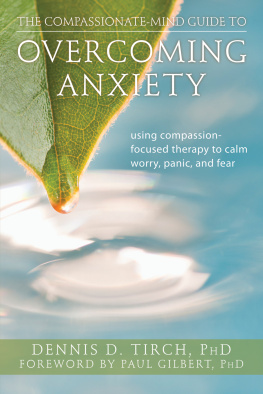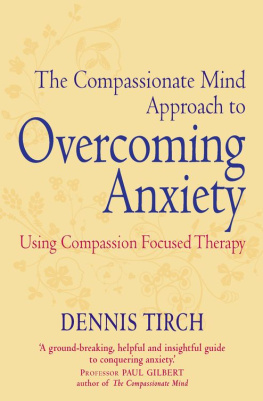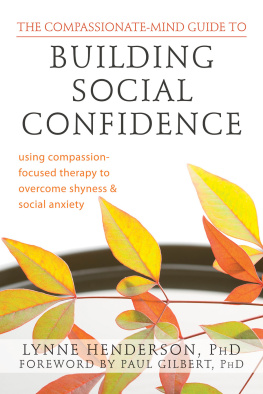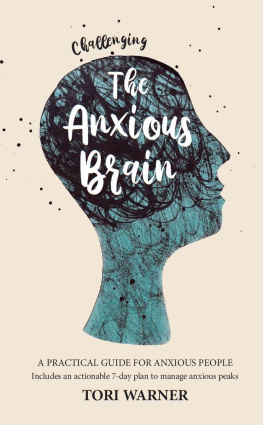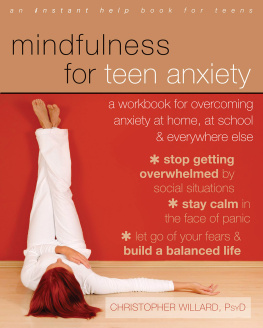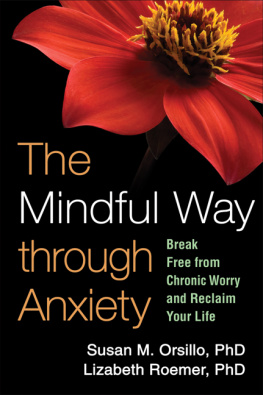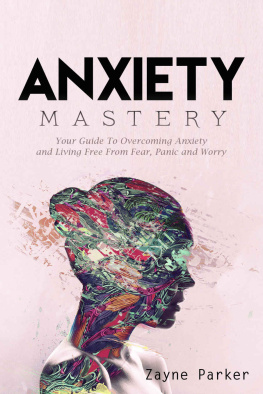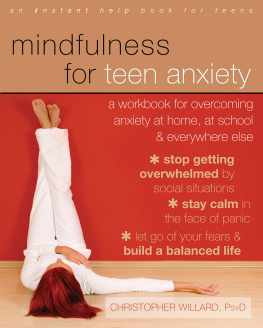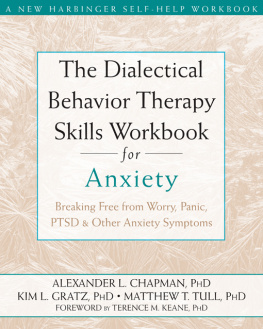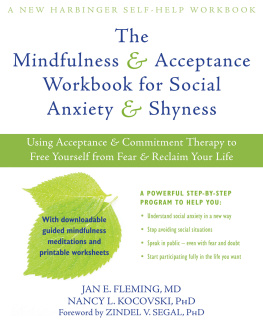Dennis D. Tirch, PhD, is associate director of the American Institute for Cognitive Therapy, founder and director of the Center for Mindfulness and Compassion-Focused Cognitive Behavioral Therapy, and serves as adjunct assistant clinical professor at Weill-Cornell Medical College. He is coauthor of books and articles on mindfulness, acceptance, and compassion, and maintains an active research program in these areas with Robert L. Leahy. Tirch is a fellow of the Academy of Cognitive Therapy and founding co-president of the New York City chapter of the Association for Contextual Behavioral Science.
Foreword writer Paul Gilbert, PhD, is a professor at the University of Derby in the United Kingdom, director of the mental health research unit at Derbyshire Mental Health Trust, founder of compassion-focused therapy, and author of The Compassionate Mind.
Learning to treat yourself with kindness and compassion is like learning to place your feet firmly on the ground. If you are going to walk out of your struggle with anxiety, you need to regain your psychological footing, and this book will show you how. In a gentle, wise, and step-by-step way, it will help you establish self-compassion as a habit of mind and bring that healing quality to your thoughts and actions. Highly recommended.
Steven C. Hayes, PhD, author of Get Out of Your Mind and Into Your Life
Easy to read, grounded in solid research, and filled with useful exercises, this book is a godsend for those who suffer from anxiety.
Kristin Neff, PhD, associate professor at the University of Texas at Austin and author of Self-Compassion
Cognitive behavior therapy (CBT) has led the way in creating solid science-based treatments. Traditionally, CBT has been an action-oriented treatment, and that action orientation has produced a lot of benefits. More recently, CBT has begun to include more work focused on acceptance, mindfulness, and self-compassion. Dennis Tirch is a master of where CBT has been and of where CBT is going. In this book, you will find a broad contemporary understanding of anxiety and a host of very, very practical ways to come into a more compassionate relationship with anxiety. The book offers a different way of being with anxiety that will have implications in your life that extend well beyond anxiety. You can expect changes in your relationship with anxiety that offer a path to rich and engaged living.
Kelly G. Wilson, PhD, cofounder of acceptance and commitment therapy, associate professor at the University of Mississippi, and author of Things Might Go Terribly, Horribly Wrong
Tirch writes with warmth and wisdom, as if he is speaking directly to you. He shows how compassion, mindfulness, and facing the difficulties of anxiety can bring personal growth. Filled with specific and powerful techniques, readers will find a new path to follow with a brilliant and compassionate guide. I highly recommend this book for all who suffer from anxiety.
Robert L. Leahy, PhD, director of The American Institute for Cognitive Therapy , clinical professor of psychology at Weill-Cornell University Medical College, and author of The Worry Cure
A superb introduction to a revolutionary new way of dealing with anxiety. The reader is led on a compelling exploration of how the anxious mind works, followed by masterful exercises that tap our innate capacity for comfort and healing self-compassion. Seamlessly integrating important research and extensive clinical experience, the author speaks through the pages with the wise, gentle voice of experience. Go ahead, try it and see what happens!
Christopher K. Germer, PhD, clinical instructor at Harvard Medical School and author of The Mindful Path to Self-Compassion
Writing in an informative, highly engaging manner, Tirch shares his considerable wisdom in both compassion-based practices and behavior therapy. He gives the reader practical and powerful tools for cultivating a sense of self-compassion in the face of anxiety. A genuine pleasure to read.
Douglas Mennin, associate professor at Hunter College of The City University of New York
The Compassionate-Mind Guide to Overcoming Anxiety is one of the most practical and accessible books for living a meaningful life despite the presence of anxiety, panic, and worry. Expect to feel compelled toward action immediately.
Todd B. Kashdan, PhD, associate professor of psychology at George Mason University and author of Curious? Discover the Missing Ingredient to a Fulfilling Life
The Compassionate-Mind Guide to Overcoming Anxiety is a remarkable integration of modern science and seasoned wisdom. Tirchs accessible writing style draws you into learning about overcoming anxiety. He even weaves beer and cake, purple gorillas, and ten-thousand-year-old poems into his writing to help you embrace a richer understanding of the anxiety and compassion connection.
D.J. Moran, PhD, author of ACT in Practice
The Compassionate-Mind Guide to Overcoming Anxiety thoughtfully addresses the experience of anxiety and is written with obvious care for the person who suffers from anxiety. Tirchs personal style and client examples bring the book to life. This is an easy-to-understand read that paves a path to self-compassion that is engaging and wise.
Robyn D. Walser, PhD, coauthor of The Mindful Couple
This book is an excellent resource for individuals suffering from anxiety. Using step-by-step strategies, Tirch systematically guides people to the invaluable tools they need to overcome their suffering and build a life filled with meaning. With wisdom and clarity, he shows how one can use compassion and mindfulness to face anxiety and bring about a fundamental life change. This book is truly a pleasure to read and will be an invaluable guide for anxiety sufferers.
Lata K. McGinn, PhD, coauthor of Treatment of Obsessive Compulsive Disorder and Treatment Plans and Interventions for Anxiety and Depression

Publishers Note
This publication is designed to provide accurate and authoritative information in regard to the subject matter covered. It is sold with the understanding that the publisher is not engaged in rendering psychological, financial, legal, or other professional services. If expert assistance or counseling is needed, the services of a competent professional should be sought.
Distributed in Canada by Raincoast Books
Copyright 2012 by Dennis D. Tirch
New Harbinger Publications, Inc.
5674 Shattuck Avenue
Oakland, CA 94609
www.newharbinger.com
First published in the UK by Constable. An imprint of Constable & Robinson Ltd.
All Rights Reserved
epub ISBN: 9781608828692
Acquired by Tesilya Hanauer; Cover design by Amy Shoup; Edited by Carole Honeychurch; Text design by Tracy Carlson
Library of Congress Cataloging-in-Publication Data
Tirch, Dennis D., 1968
The compassionate-mind guide to overcoming anxiety : using compassion-focused therapy to calm worry, panic, and fear / Dennis Tirch ; foreword by Paul Gilbert.
p. cm.
Includes bibliographical references.
ISBN 978-1-60882-036-8 (pbk. : alk. paper)
1. Anxiety. 2. Emotion-focused therapy. I. Title.
BF575.A6T57 2012
152.46--dc23
2012005438
To my mother, Janet
Contents
How This Book Is Structured
The Experience of Anxiety Types of Anxiety How Common Is Anxiety?
Better Safe Than Sorry Evolution and Forms of Anxiety Exposure with Compassion
Anxiety, Compassion, and Your Two Brains

